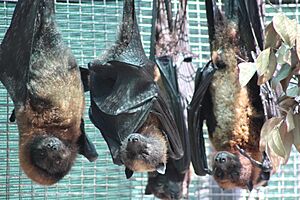Lubee Bat Conservancy facts for kids
The Lubee Bat Conservancy is a special place in Gainesville, Florida, that helps bats. It is a nonprofit organization, which means it works to help animals and nature, not to make money. This amazing center was started in 1989 by Luis F. Bacardi.
At first, it helped many kinds of endangered animals. Later, it decided to focus only on bats, especially large bats called megabats. Lubee Bat Conservancy is approved by the Association of Zoos and Aquariums. This means it meets high standards for animal care.
The Story of Lubee Bat Conservancy
The Lubee Bat Conservancy began as the Lubee Foundation, Inc., in 1989. It was created by Luis F. Bacardi. The name "Lubee" comes from his name, Luis Bacardi.
In its early years, the center was home to many different animals. These included parrots, monkeys, and ostriches. The Lubee Foundation even helped care for animals before they moved to Disney's Animal Kingdom.
The Bacardi family had a special connection to bats. Bats were the inspiration for their company's logo. When Luis Bacardi passed away in 1991, the foundation changed its focus. It decided to care only for bats. All the other animals found new homes.
A Home for Bats: Lubee's Facilities
Lubee Bat Conservancy is located on a large ranch. It covers about 110 acres (45 hectares). This is about 10 miles (16 km) north of Gainesville, Florida.
The conservancy has special buildings just for bats. These areas have controlled temperatures to keep the bats comfortable. There are also outdoor spaces where bats can fly around.
Lubee also has a medical center for the bats. This includes an examination room with equipment for safe check-ups. There are also special areas for bats to recover if they are sick or injured.
Amazing Bats at Lubee
Lubee Bat Conservancy is home to over 200 megabats. Megabats are also known as fruit bats or flying foxes. They are usually larger than other bats and eat fruit or nectar.
Here are some of the megabat species living at Lubee:
- Straw-coloured fruit bat (Eidolon helvum)
- Egyptian fruit bat (Rousettus aegyptiacus)
- Gray-headed flying fox (Pteropus poliocephalus)
- Indian flying fox (Pteropus giganteus)
- Small flying fox (Pteropus hypomelanus)
- Large flying fox (Pteropus vampyrus)
- Lesser short-nosed fruit bat (Cynopterus brachyotis)
- Little golden-mantled flying fox (Pteropus pumilus)
- Rodrigues flying fox (Pteropus rodricensis)
- Spectacled flying fox (Pteropus conspicillatus)
In 2018, Lubee also welcomed some new bats. These bats came from another organization that closed. Among them were two species of microbats. Microbats are generally smaller and often eat insects.
These microbat species include:
- Big brown bat (Eptesicus fuscus)
- Evening bat (Nycticeius humeralis)
 | DeHart Hubbard |
 | Wilma Rudolph |
 | Jesse Owens |
 | Jackie Joyner-Kersee |
 | Major Taylor |



